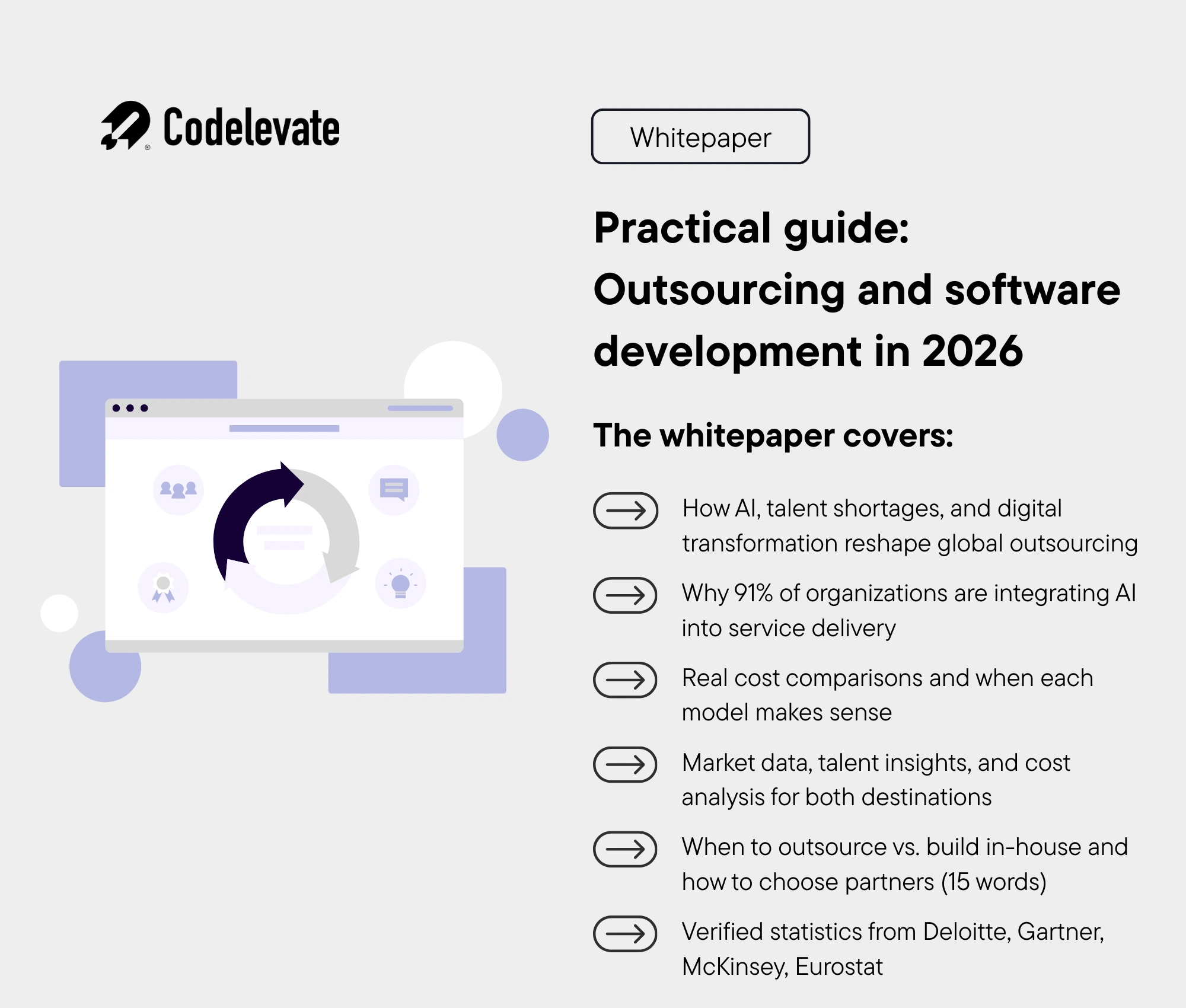IT outsourcing in Bulgaria: Overview and benefits
IT outsourcing in Bulgaria stands out as a smart solution for companies looking to access advanced technology, scalable teams, and top-notch skills. With rapidly improving digital infrastructure, a favorable regulatory environment, and a growing tech talent pool, Bulgaria attracts businesses across Europe and beyond. Whether your company wants to accelerate digital transformation, improve cloud computing capabilities, or optimize software development costs, smart outsourcing strategies can significantly improve your bottom line.
This comprehensive guide uncovers practical cost-saving tips, essential insights, and trusted tools you can use to create maximum value through IT outsourcing in Bulgaria - all explained in simple, straightforward language.
Why Bulgaria is a top IT outsourcing destination
Bulgaria offers a compelling combination of skilled tech talent, cost advantages, EU compliance, and strategic positioning in Southeast Europe. Companies outsourcing IT services here benefit from:
- Competitive cost structure: Lower salaries and operating costs compared to Western Europe.
- Large STEM talent pool: Thousands of IT graduates annually feeding software development, AI, and data science roles.
- Government support for digital innovation: Grants, tax incentives, and tech parks promote R&D.
- EU membership: Ensures regulatory stability, GDPR compliance, and standardization for outsourcing clients.
According to Statista, the IT outsourcing market in Bulgaria is projected to reach approximately US$182 million in revenue by 2025, with a CAGR of over 7% through 2030. Cities such as Sofia, Varna, and Burgas are emerging as tech hubs, supported by strong educational institutions and incubators.
Top benefits of outsourcing IT in Bulgaria
Access to highly skilled, cost-efficient tech professionals
Bulgaria has tens of thousands of software developers and ICT specialists, fluent in English and trained in technologies such as Python, Java, .NET, JavaScript, and data science. Due to lower labor costs than Western Europe, companies get excellent expertise without the premium price tag.
Strong digital infrastructure and growing innovation ecosystem
Bulgaria has invested heavily in ICT infrastructure. Tech parks, startup incubators, and co-working spaces are flourishing, especially in Sofia. Government initiatives promote digital transformation, AI adoption, and innovation funding, attracting global clients.
Favorable business environment and low taxes
With one of the lowest corporate tax rates in the EU (~10%) and flat income tax for individuals, Bulgaria provides cost-effective outsourcing solutions. EU membership ensures legal, privacy, and regulatory alignment, including GDPR compliance, which is crucial for European clients.
Good time zone alignment and cultural compatibility
Bulgaria shares similar working hours with much of Western and Central Europe, facilitating collaboration. Communication is professional and direct, and Bulgarian tech teams are experienced in international projects, understanding Western business standards.
Understanding cost drivers in Bulgarian IT outsourcing
Before implementing cost-saving strategies, it’s important to understand the factors influencing outsourcing costs in Bulgaria:
- Local salary levels and labor competition: Senior roles and niche skills (AI, cybersecurity) command higher rates. Location (Sofia vs. smaller cities) also affects pricing.
- Project complexity and technology stack: Microservices, AI/ML integration, or multi-platform projects increase costs.
- Infrastructure, tools, and cloud costs: Hosting, DevOps, licensing, and cloud services add expenses if not optimized.
- Compliance and data security: GDPR, IP ownership, and proper security practices are mandatory but add costs.
Although Bulgarian rates are more affordable than Western Europe, overlooking these drivers can lead to budget overruns.
Cost-saving tips for IT outsourcing in Bulgaria
Staff augmentation
Add vetted Bulgarian developers, QA, or DevOps engineers temporarily to scale your team up or down. Ideal for fixed-duration projects or specialist expertise without permanent hires.
Managed services
Outsource recurring tasks like infrastructure management, maintenance, or security to a Bulgarian vendor, freeing your in-house team to focus on innovation and product development.
Full project outsourcing
Delegate complete projects such as software development, mobile apps, or system integrations to experienced Bulgarian firms. Proven expertise reduces overhead and ensures high-quality delivery.
How to choose the right delivery model
Step 1: Combine local and nearshore talent
Many companies blend a local project manager with remote Bulgarian teams. Platforms like Deel and Remote simplify hiring, payroll, and compliance for global teams.
Step 2: Compare and benchmark rates
- Junior developers: €25–€50/hour
- Senior architects or AI specialists: €80–€120/hour
Use Glassdoor and PayScale to benchmark before finalizing agreements.
Step 3: Set SLAs and KPIs clearly
Well-defined Service Level Agreements (SLAs) and Key Performance Indicators (KPIs) prevent paying for low-quality or missed deliverables. Tools like Contractbook help manage this efficiently.
Step 4: Leverage open-source and cloud tools
Bulgarian developers excel with open-source stacks. Platforms like GitHub, GitLab, and public cloud providers (AWS, Azure) reduce licensing costs. Cloud spend analysis tools help avoid waste.
Step 5: Engage with local tech communities
Networking through Sofia Startup Week, WebIt Festival, and Sofia Tech Park gives access to freelance talent, mentorship, and cost-efficient hiring.
Step 6: Optimize data privacy and compliance workflows
Ensure GDPR compliance, audit rights, and ISO 27001 certifications are included in vendor agreements from the start.
Useful tools for IT outsourcing in Bulgaria
These platforms simplify international hiring by handling contracts, payments, taxes, and labor law compliance, allowing you to manage remote Bulgarian teams seamlessly.
Use these tools to research market rates for Bulgarian IT specialists. They help you ensure competitive compensation while controlling costs.
- Contractbook: Contract creation & tracking
Automate contract drafting, signing, and management. Track milestones, obligations, and renewals efficiently to avoid legal risks.
These tools simplify GDPR compliance, security audits, and privacy management, ensuring your outsourced projects meet EU standards.
Collaborative platforms for code versioning, project management, and team coordination. They reduce licensing costs while improving transparency and workflow.
- Meetup: Bulgarian tech community events
Connect with local developers, attend networking events, and tap into Bulgaria’s growing tech community for talent and collaboration opportunities.
- Clutch: Verified IT provider reviews
Read client reviews and evaluate provider credibility. This helps you choose trusted outsourcing partners with proven experience in your sector.
Legal tips
- Verify provider registration in Bulgaria
Ensure your outsourcing partner is legally registered under Bulgarian corporate laws. This helps guarantee legitimacy, protects your business from potential legal disputes, and ensures compliance with local regulations.
- Include IP ownership, exit clauses, and GDPR compliance in contracts
Clearly define who owns the intellectual property, how projects will be handled if the contract ends, and ensure GDPR compliance is explicitly included. This protects your proprietary code, sensitive data, and avoids future legal conflicts.
- Be aware of domestic labor law requirements
Bulgarian labor laws dictate employee rights, notice periods, and benefits. Understanding these requirements ensures your contracts and project engagements remain compliant and avoid potential penalties.
Common mistakes to avoid
- Skipping due diligence
Failing to properly vet your outsourcing partner can result in delays, poor quality, or non-compliance. Always check references, past projects, and certifications before committing.
- Focusing only on low hourly rates
Choosing vendors based solely on cost can compromise quality. Hidden costs, delays, and additional overhead often outweigh initial savings. Balance cost with expertise and reliability.
- Underestimating compliance or tax costs
Ignoring GDPR, IP laws, or corporate tax implications can lead to fines, audits, or legal disputes. Factor compliance into your budget and project planning.
- Not piloting with a small project first
Jumping into large projects without testing a provider can be risky. Start with a small module or feature to evaluate communication, quality, and workflow efficiency before scaling up.
Getting started
1. Identify required skills (mobile, backend, AI, DevOps)
Clearly define the technical expertise your project requires. Knowing whether you need AI specialists, DevOps engineers, or mobile developers helps target the right providers.
2. Set a clear budget including overhead & compliance
Include not only salaries and outsourcing fees, but also infrastructure, software tools, compliance, and other overhead costs to avoid unexpected expenses.
3. Benchmark rates using Glassdoor / PayScale
Use tools like Glassdoor or PayScale to research market rates in Bulgaria, ensuring you pay competitive yet reasonable prices.
4. Shortlist flexible vendors
Choose providers that can scale teams up or down, adapt to project changes, and offer long-term collaboration. Flexibility is key for cost control and project success.
5. Define detailed scope, milestones, and quality expectations
Document every deliverable, deadline, and expected quality standard. Clear milestones prevent scope creep and keep both parties aligned throughout the project.
Outsourcing trends shaping 2025 and beyond
- Increasing AI and automation adoption
Companies are automating tasks like code testing, security scans, and analytics, reducing manual work and lowering costs while improving accuracy.
- Remote & hybrid teams standardization
More businesses are blending local project leads with remote specialists, creating flexible, efficient, and scalable teams across geographies.
- Streamlined compliance, payment, and contract tools
Platforms like Deel and Contractbook simplify hiring, legal compliance, and payment processes for international outsourcing.
- Focus on sustainability and green digital infrastructure
Environmental awareness is growing, and outsourcing partners are investing in energy-efficient data centers, cloud infrastructure, and sustainable practices to meet ESG standards.
Conclusion
IT outsourcing in Bulgaria is a powerful way to access top-quality tech talent, advanced infrastructure, and a business environment aligned with EU standards. While cost considerations remain, the right strategies, tools, and partnerships allow your company to fully leverage Bulgarian IT expertise without overspending. To summarize, combine hybrid teams with remote or nearshore talent as needed, negotiate long-term contracts for better rates, and utilize local communities, open-source technologies, and government support to maximize ROI. Always prioritize transparency in contracts, deliverables, and communication, and regularly track KPIs to stay on course. By following these proven cost-saving strategies, IT outsourcing in Bulgaria can help your business accelerate innovation, maintain high quality, and stay cost-competitive, regardless of your market or growth ambitions.
Want to make smarter outsourcing decisions? Get our free whitepaper with just one click and dive deeper into global outsourcing!


Why Codelevate is your best outsourcing partner
At Codelevate, we’re all about working closely with our clients to create high-quality, scalable solutions that match your business goals and timelines. We keep things simple with a fixed pricing model, so there are no surprise costs or scope creep along the way. With over 120 clients under our belt, we’ve got the experience to manage projects of all sizes. We’re also committed to data privacy and sustainable practices, so you can trust that your project is in good hands. Whether you're a startup or an established enterprise, our team’s expertise in SaaS and AI is always here to help you succeed.



.webp)


.svg)




